Elizabeth Roderick's Blog, page 5
February 28, 2017
Don’t use own voices writers as trophies
I’m going to take this opportunity to hope a nerurodiverse person’s voice actually gets heard for once.
I am a person with psychosis. That means, legally (in fact, as a matter of course), I can be locked up for committing no crime at all, but only because I might-at some point-commit a crime. I’ve been harassed by police, kicked out of businesses and public buildings for acting “weird”. My partner-also neurodiverse- was almost shot for having a completely nonviolent psychotic episode. My voice is not often heard. And I don’t appreciate that it’s being suppressed now.
So yeah. It was bad timing to bring this up now, because I don’t want to at all take away from the celebration (by AUTHORS and READERS) that an awesome Own Voices book got published. But my point is valid. Publishers shouldn’t be patting themselves on the back. And I have a right to say it.
Don’t tell me that I don’t have a right to my opinion, and that if I’m expressing that opinion I’m “talking over” someone else.
Don’t tell me that I don’t have a right to my frustration about continued bias in the gatekeepers of publishing. Nor am I “bitter” or “whining”. That’s a really privileged point of view. I’m standing up for myself, and for other marginalized voices. This argument sounds like a lot of the bullshit Trumpists spout about protesters and marginalized voices.
So yeah. Misinterpret me all that you want, and then don’t listen when I explain, apologize, etc. Threaten an Own Voices writer’s career for expressing her opinion. But realize that you’re bullying and suppressing a marginalized voice. That’s not discourse. It’s not promoting diversity or acceptance. You are, in fact, a HUGE part of the problem.
I’m taking out the reference to the book in question because people thought I was trying to say it shouldn’t be celebrated.
I apologize greatly for hurting people’s feelings. I didn’t mean to say people shouldn’t be celebrating today. I should have left this post for another day, because my points are still valid.
If anyone is still actually reading this instead of just responding to online comments, then I’ll be glad for all this wank, if maybe just one or two people see the validity in my points. My point was never to say Own Voices writing shouldn’t be celebrated—in fact, I’ve said the opposite, a million times. Own Voices books are something special beyond just being”great” books.
But anyone who thinks I’m bitter about the publishing industry, I’m not. I’m speaking truth as I see it, and as a lot of people see it. Just because one great Own Voices book gets published doesn’t mean that there isn’t a problem in the industry. A lot of people have approached me and told me stories very similar to mine about their experience with publishing “gatekeepers”.
A lot of us think the publishing industry has a long way to go, and that the PUBLISHING INDUSTRY shouldn’t be throwing itself a big ol’ party quite yet.
Don’t pat yourselves on the back for publishing a great book. That’s what you supposedly exist to do.
For every Own Voices book that gets published, there’s hundreds of other Own Voices books that don’t. Sure, some of those books probably need some work. After all, none of us were born knowing how to write, no matter how interesting our points of view are. But a lot of those own voices books are really good, and still fall through the cracks.
I’m glad that a lot of agents and editors are putting out calls for Own Voices books. This is a good start. But don’t pat yourselves on the back yet. I’m an Own Voices writer, too, and I—along with a lot of others—can see just how far the publishing community has to go.
Agents and editors read hundreds of queries a day, and untold numbers of submissions. They are the first ones to say that, if something doesn’t grab their attention right off, if they don’t love it, then they aren’t the right agent for that book. This is s big problem when we’re talking about Own Voices books. Most agents and editors are white, neurotypical, straight, cis, etc., and come from the sort of background that allows them to major in English. (I’m generalizing here, and I apologize. But the numbers back me up.) So is it any big surprise that they find it harder to identify with different points of view?
When you read something that’s so far outside of your cultural center, it’s probably going to make you uncomfortable, or even defensive (I may not have neurotypical privilege, but I have white privilege, so believe me, I know what that defensiveness feels like. We need to fight it and just listen). These points of view might be jarring to us, or even seem unrealistic. Agents, when reading Own Voices submissions, probably won’t even take time to quantify why they’re having the reaction they do. They’ll just toss the manuscript aside as “not for them”. The Own Voices submissions that the agents do like might be relatable for them in some oblique way. The writing might have been toned down on purpose by the author to be more accessible for other audiences (yes, this happens. I’ve done it, and I’m not the only one). Or, they might just be written a million times better than a book the agent would usually sign by someone with a similar viewpoint as them.
Before anyone starts calling me a snowflake and telling me I’m just bitter because I don’t write well enough to get published, and/or that I want “special treatment” for Own Voices writers…check yourselves. For one, I am published (that’s one of the reason I’m writing this: I’m standing up for a lot of other Own Voices writers who aren’t yet published, and either aren’t comfortable standing up to the publishing community for fear of getting blacklisted, or don’t yet have enough confidence in their skill to be sure of the bias in publishing). For another, none of us want “special treatment”. We’re trying to get the same quality of treatment that those more advantaged than us have. We’re trying to get people to listen, because it’s so easy to drown out our voices as “unrelatable” or “unlikable”.
I do, however, want agents and editors to consider giving Own Voices submissions more than the once-over a “regular” submission would get. Ask yourselves why you’re not relating to the writing. Is the character voice too different? Do you feel disoriented by their way of life or outlook? Does the tone seem too dark for you? Does the plot take turns that are atypical, perhaps because the character interacts with their environment in a way that you’re not expecting? Are you uncomfortable with how the main character views people who are more advantaged than them? Worse yet, do you already have a book on your list with an x-type of character, so you think there’s no room for one more? These are all reasons that I, and a lot of other Own Voices writers, have been given for why our books were rejected. Perhaps you might want to give those books another chance, to see if perhaps you’re missing out on a great book because of a bias you weren’t perhaps aware of.
Yes, we know publishing is a difficult business. We, as Own Voices writers, know this as much—perhaps better—than anyone. And we’ll keep trying. We’ll work so hard at our craft that one day we’ll be good enough to be successful, even if that means we have to write a million times better than a non-Own Voices writer. But, meanwhile, stop congratulating yourselves for publishing Own Voices books, and instead just congratulate the author for writing a great book, and yourselves for doing your job—just like you would with any manuscript. Because Own Voices writers aren’t “trophies” for you to display on your list to prove you’re open-minded. We’re not here to fill a quota, and we’re not here to parrot your own worldview back at you and make you feel good. We’re here to tell our stories, and we’ll keep doing that, whether you like it or not.


February 25, 2017
Article in SLATE About Sensitivity Reading
I think I neglected to mention I was interviewed by Slate about my experience as a sensitivity reader. They of course took all my quotes out of context, so I don’t know how I come off here, but it’s still super cool to be interviewed, and that they did an article on this subject in the first place!
Read the article here.


February 21, 2017
FLAME by Ayden K. Morgen -RELEASE BLITZ and GIVEAWAY!
I’m very excited to announce that the long awaited (and much anticipated!) third book of the Amazon Bestselling RAGNAROK PROPHESIES series has finally arrived! Join Arionna Jacobs and Dace Matthews as they race to stop the apocalypse in this intense and emotional series by A.K. Morgen.
Read on below for all the details, including a giveaway!

SUMMARY
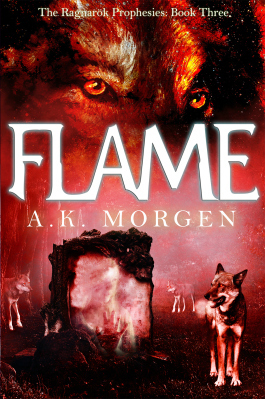
Who do you trust when betrayal threatens to destroy everything you hold dear?
When Arionna Jacobs fled town in a desperate bid to save Dace Matthews, she never expected the chaos she would leave in her wake. Now her closest friend is dead, and another is missing, forcing Ari to return to face the devastating consequences of her actions and the broken boy she left behind.
Her problems are only just beginning.
Even as her bond with Dace grows stronger, Arionna finds herself weakening when Freki’s cage shatters. Fighting the wolf for control is tearing her apart piece by piece. And at every turn, she finds that those she’s put her faith in aren’t who they seem, bringing her face to face with Sköll and Hati. As the depth of their betrayal is revealed, Freki spirals out of control, and Arionna must face her greatest fear: losing herself to the fierce wolf within.
The world balances on the edge of a blade, and one wrong move will destroy it all.
With few allies she can trust and little choice left, Arionna must decide between the lives of her friends and her own future with the alpha she loves. Will she be able to stand firm for the sake of the world, or will she falter in the face of defeat?
BOOK LINKS:
AMAZON | GOODREADS | BARNES AND NOBLE
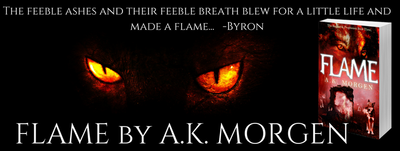
EXCERPT
“Arionna, dammit, wake up.”
Unseen hands gripped my upper arms, shaking me. A familiar voice called my name over and over. Furious howls ripped through the air.
None of those sounds made sense to me.
I felt different, like I’d been taken apart and put back together in the wrong order. Everything hurt. My body ached, muscles locked tight in protest. My head throbbed. Each painful pulse rattled against my skull, sending ripples down my neck and into my back.
I groaned and rolled onto my side.
The hands shaking me relaxed.
I fought to open my eyes, then blinked, confused. Worn brown carpet scratched against the side of my face. The bottom edge of a pale blue bed-sham fluttered inches from me. Dust bunnies and small pieces of plastic were strewn beneath the sagging bed. A table and two chairs were grouped on the other side. A crack ran up the leg of one chair, splitting the wood.
None of the room looked familiar.
Where am I?
The voice calling my name stopped mid-shout and sighed.
Oh, thank god, he said.
For what? I wondered, marveling that the words came from inside my mind, but didn’t belong to me. How was that possible?
I couldn’t place the soft, silky tones either, but they made my stomach flip and my heart flutter. I knew the speaker. At least I thought I did. Before I could ask him who he was or how he spoke in my head, someone blew out a sharp breath. This time, the sound didn’t come from inside.
“Finally,” that second voice said.
Nope. Definitely not coming from my mind.
I rolled my eyes toward the relieved sound, and then frowned at the guy leaning over me. Long, dark hair hung in his face. His eyes were black, and full of concern. His features were sharp, severe, but handsome.
This time I was certain; I knew this guy.
“Ronan,” I said. His name was Ronan LaCrosse, and mine was… Arionna. Yes, Arionna Jacobs. Memory began to slowly trickle back in. We were at a motel in Illinois, looking for someone. And the howls were coming from Fuki, the little wolf we’d brought with us, though I couldn’t see him.
Where was he?
I tried to figure out why I was on the floor, but came up with a big blank.
“What happened?” I asked, looking up at Ronan.
He held out a hand for me, then pulled me into a sitting position.
The room tilted before straightening again. I clutched my head in my hands, groaning. When the initial wave of nausea passed, I tilted my head up slowly so I could see Ronan. “Did I hit my head?” I asked, trying to blink away the dark spots floating in my peripheral.
“You don’t remember?” He narrowed his eyes, tilting his head to the side like a raven assessing me.
I scooted back against the edge of the bed, frowning.
What was I supposed to remember?

GIVEAWAY
a Rafflecopter giveaway
https://widget-prime.rafflecopter.com/launch.js
ABOUT THE AUTHOR

A.K. Morgen is the Amazon Bestselling author of the Ragnarök
Prophesies series. She lives in the heart of Arkansas with her childhood
sweetheart/husband of thirteen years, and their six furry minions. When not
writing, she spends her time hiking, reading, volunteering, causing mischief,
and building a Spork army. Ayden graduated summa
cum laude with her Bachelor of Science degree in Criminal Justice and
Forensic Psychology in 2009 before going on to complete her graduate degree in
CJ and Law. She currently puts her education to use in the social services and
CJ field.
Ayden also writes New Adult and contemporary romance under the penname Ayden K.
Morgen.
You can find her on Twitter, Facebook, or via her website at http://akmorgen.com.


January 22, 2017
Going Homeless for the Homeless
I’ve been inspired by the women who ran from NYC to DC to raise money for Planned Parenthood. I’ve had an idea, and I [image error]want to put out feelers to see what kind of support this idea would have, because it will be a difficult thing to do and I need to know it would have an effect before I set out to do it.
I would like to walk from here (Yakima, WA) to our state capital (Olympia, WA), a distance of around 180 miles. I would be living homeless, in order to raise awareness and money about the plight of the homeless and neurodiverse. I wouldn’t be accepting money directly for these causes – I would ask for pledges to charities like NAMI.
I’d like to know who would be willing to donate, and who would help me by amplifying my social media presence with regard to this. I would love to hear your thoughts, and would love it even more if you’d retweet, reblog, or share this post to see if any of your friends might be interested in supporting me one way or another on this journey.
If I got enough awareness, my next trip would be to DC.
And yes, I’d be living homeless, as authentically as possible, but I’d make it as safe as I could in ways I will brainstorm with you and discuss later.
Who’s with me?


January 6, 2017
A Stark Look at Neurodiversity and What it Takes to Be an Ally
It’s been a long time since I ranted at y’all. I can’t say I’ve been saving up things to rant about, because I’ve trained myself to let stuff go so that it doesn’t dissolve my brain in caustic acid. But this rant needs to happen.
This is going to be the most brutal window into what it’s like for me to live with mental illness that I’ve ever given you. I’ve decided that my entire recovery depends on me being emotionally honest with myself and others, and on not playing the victim by putting up with other people’s shit. My feelings are important, and it shouldn’t be okay to hurt me just because I act “crazy” sometimes.
If your life is too pretty, you might want to stop reading, because you probably won’t understand any of this.
Neurodiverse people put up with discrimination, both subtle and otherwise, constantly. So much, in fact, that a lot of us don’t even realize that it’s happening, and we end up being the ones to apologize when we’re the ones suffering from prejudice.
Neurodiversity comes in a lot of forms and levels, from nearly constant, full-blown psychosis to mild, periodic depression. There’s also autism, which I won’t speak to here because I’m no expert, though I have observed that people on the autism spectrum suffer a lot of the same types of discrimination that “mentally ill” people do.
There is really only one all-encompassing way to describe all forms of neurodiversity. It’s an inability, at some level, to correctly play society’s game. I know most neurotypical people feel this applies to them, but they’re fundamentally misunderstanding what I mean. “Not being able to play society’s game” doesn’t mean you’re sometimes weird or awkward or say the wrong thing…as far as I can tell, that stuff is a big part of society’s game. Neurodiversity means that you act in ways that make you fundamentally incompatible with social norms, in ways that affect your ability to get along with others and be “functional”. This isn’t voluntary; it’s just the way we are.
I’ll clarify here that, while it can affect your ability to get along with people, neurodiversity is not a synonym for “asshole”. Yes, some neurodiverse people are assholes, or they act like assholes sometimes (like everyone else), but not all assholes are mentally ill. I’m really damn tired of people saying Trump is mentally ill, for instance. That’s an insult to mentally- ill people. Trump is just a self-involved, inconsiderate, manipulative, unintelligent fuckhead. NOT. THE SAME. THING. It seems like assholes do pretty damn well in society a lot of the time. By getting elected president of the U.S., for example.
Hardly anyone would say that they hate neurodiverse people. It’s just like hardly anyone would say they’re racist, but it doesn’t stop them from doing/saying racist things. With neurodiversity, others don’t really understand what it is or what it looks like, so they end up punishing and demeaning us, even on an institutional level, for behavior we can’t easily control, or can’t control at all. They’re discriminating against us for being who we are.
I can understand why that is, though. Sometimes, neurodiverse behavior isn’t pretty. Neurotypical behavior isn’t pretty sometimes, either, but the neurodiverse have the disadvantage of having more overblown reactions to “triggers” (and I shouldn’t put quotes around this word, because it’s the correct use of a word that is used incorrectly so often) than neurotypical people do, and also of not usually being able to wait until they’re behind closed doors to have those reactions. So, we’re often the ones that get called the asshole for having an episode, when others either don’t know the context (didn’t see what led up to us acting that way), or don’t even understand what set us off.
Unfortunately, in the case of those who know us well, these triggers become a really good way to intentionally or subliminally manipulate and abuse us. They say or do something they know will set us off, and then point to us and say, “See? She’s the bad one.”
Neurodiverse people can be hard for others to love. We get rejected and isolated, some of us on a daily basis, sometimes in just about every interaction. This contributes to the progression of our illness, and becomes sort of a feedback loop. What neurotypical people don’t realize is that y’all are just the same as us. We’re no more threatening, toxic, or hard to deal with than you are, on average, though there are jerkwipes on both sides of the line. We’re just different. We express our emotions differently, because our emotions can take us over more powerfully than they do neurotypical people, but that doesn’t mean we’re dangerous. It just means y’all have to give us a minute, and we’ll be back with you shortly.
And, when we come back, it will probably with an apology—though we rarely get one in return from you guys, because you rarely see what it was you did that was insulting/abusive/discriminatory, while we’re trained from birth to think that we’re in the wrong, because we don’t fit social norms.
In order to be a true ally of the neurodiverse community, you have to understand the above, and accept it, instead of chiding us or being derisive about our behavior. Accepting us goes far beyond language policing or treating us like children who need coddled and taken care of, and then ignored when we’re having a fit. We’re adults— valid, wonderful human beings just like you guys—and should be treated as such. Doesn’t mean you have to like what we do, but it’d be nice if you’d understand and forgive us, and take a look at yourself, as well.
I’m going to give an example of what subtle discrimination looks like, and then an example of what pure acceptance looks like.
I’m not doing this to call anyone out. This is a true attempt to educate, because educating people about this sort of stuff is part and parcel of my survival in this society—I don’t have a chance in hell of ever being “normal”, so my only hope is to try to get people to accept me (and hopefully others) on our own terms. Besides, in the following examples, I’m calling myself out more than anyone, because I was also in the wrong.
Even though my shrink tells me my PTSD is more symptomatic lately (I was recently assaulted), I don’t always realize that I’m freaking out. Believe me, I’m working on it. I’m the only one who can control my behavior. I have a harder time with it than neurotypical people do, but I will get stable again, because I’m a pretty tough lady.
The only way I’m going to get better is by being emotionally honest with myself. Similarly, the only way neurotypical people are going to be good allies of the neurodiverse community is to be honest with themselves, and aware of their own behavior toward us.
So, my PTSD is from abuse. As a young teenager, I was physically/emotionally/sexually abused for a long period of time. This abuse has colored the progression of my entire life. It was a huge cause of the end of my last marriage, because when my husband said something insulting, I would have an overblown reaction, which would cause him to become more insulting, and so on.
I’m in a fairly unstable state now, so whenever someone says something that I perceive to be abusive or insulting, I freak out. Maybe not as much as when I’m unmedicated, but still.
There was a large amount of wank on my personal Facebook page, and a local group page, a couple of days ago because of a couple dogs that killed some of my chickens. I won’t go into the whole story; if you want it, I didn’t delete or alter the thread. It’s on my FB feed.
Long story short, this one dude ended up telling me I’m naïve, and that the dogs should have killed my chickens because they had as much right to eat as I did. Garden variety asshole, right? Except I actually need those eggs to eat since I’m living on a tight budget since my divorce, not to mention the chickens were my pets. The guy knew that. So this statement felt a lot like things my ex used to say to me about me being immature and worthless. I got really agitated, and I reacted without really thinking. I told him, “If you think you have every bit a right to eat as a dog does, kill yourself and make yourself into dog food for rescue dogs.”
This was a horrible word choice, but in my mind at the time, I was turning the tables and re-stating what he’d just said to me. I realized later that it was a poor word choice, but at least it got the guy to shut the fuck up, so I thought it was no big deal. Except it’s the internet, where everything is a big deal.
Another lady came back days later, and read only my statement. She admitted she didn’t read the context, or anything he’d said. All she saw was me freaking out. So, I was the one that got all the blame. “I know you care about people with mental illness, so I just wanted you to be aware that what you said is wrong.”
I apologized for what I’d said, but I also pointed out the irony to her. She didn’t call the other guy out for being abusive and demeaning. Be aware, I said, that my reaction is what mental illness—a PTSD trigger—looks like. That’s what true “awareness” of mental illness is.
She never responded. This is typical. We get rejected as not worth listening to, as hysterical, as an asshole. Rejection is another trigger for me, like it is for a lot of us. Instead of going off on that lady, I figured it would be healthier to go off on a blog piece, in the faint hope of educating someone.
Now, let me call myself out even more by showing you what true acceptance of mental illness looks like. I’ll give a trigger warning, though I don’t think trigger warnings are healthy when we’re dealing with real-life events. We can only heal by facing our triggers. But, anyhow, this is a pretty graphic description of physical violence and verbal…I won’t call it abuse in this case. But in another context it would be.
If you are my mom/dad, I suggest you stop reading now.
A certain friend of mine and I were having ourselves a fun white trash evening recently. Long story short, he was goofing around and called me a “dirty whore”.
I knew he was goofing around, but this brought me to a standstill. “Don’t call me that.”
He, though, didn’t see what the big deal was: he was just joking, and I knew it. So, he called me a dirty whore again.
I reacted before I knew what was happening. It was like watching myself from the outside. I punched him. Not hard, but in the exact same place he’d been punched another time, which had broken his tooth and ultimately put him in a coma for three days.
So, he (who is neurodiverse, also) had the same reaction. He punched me in the eye. Again, not hard, but it was enough to bring me to my senses.
We were both blasted off into PTSD land. He was alternating between threatening to call the cops if I didn’t give him money, and gently examining my eye and saying, “Oh, my God Liz, are you okay?” Then yelling at me for making him hit a girl. I for my part, was sobbing and apologizing my ass off and begging him to not leave or call the cops. See? Good ol’ white trash fun all around.
We calmed down eventually and talked. “Someone called you a dirty whore before, right?” he said, and I nodded. “I’m sorry, I didn’t know,” he said.
“I’m sorry I punched you, especially right where that other guy did.”
And we spoke no more of it. Neither of us needed an explanation. Neither of us judged or even pitied the other. We understood one another. To us, it wasn’t that big a deal. Just a couple people overreacting like the freaks we are. Neither of us had so much as a bruise, to be clear.
That’s what it takes to accept people like us. Most of you won’t be able to do that, because our behavior is so easy to point at and say, “wrong”. Most of you, having read this, will be horrified, and will unfriend me/never talk to me again, because you don’t want to be associated with toxic people like me. But your behavior is just as wrong sometimes, it just takes longer to explain why because the abuse is emotional, and/or you do it behind closed doors so it’s harder to call you out on it.
So, if you want to be our allies, be patient with us, listen, and try to understand. It will require putting up with some bullshit, yes. But it will be worth it. We’re wonderful people, and you’ll also find a lot of us more willing to put up with YOUR bullshit than most, because we know what it’s like to do things we’re not proud of, and be rejected.


January 5, 2017
*HUGE GIVEAWAY*- SWEET SIXTEEN CONTEST!!!
As some of you know, I recently finished drafting my SIXTEENTH manuscript!
WOOO!
I would like to celebrate this milestone, along with the upcoming release of LOVE AND WAR, the third installment in THE OTHER PLACE SERIES, which is set to drop on March 7, 2017.
I would like to send you all cake and champagne and kisses, but the logistics of that are difficult. Instead, I’m going to have a contest. I’m going to pick SIXTEEN WINNERS. Fourteen of those winners will get a free Kindle copy of one of my books – their choice. The second place winner will get a free signed paperback of one of my books – again, their choice. The grand prize winner will get a signed paperback, AND A $50 AMAZON GIFT CARD.
Yes. I did say $50. And I meant it.
The rules are simple. If you are already signed up for my newsletter, you are entered. If you’re not signed up yet, SIGN UP HERE to enter. You’ll also get a free anthology for signing up!
If you want an EXTRA ENTRY, refer someone else to sign up for my newsletter, and either comment on this entry , send me a DM on Twitter or Facebook, or shoot me an email to tell me who you referred.
Winners will be picked randomly on MARCH 7, 2017 – which is the release date for LOVE AND WAR.
Thank you for your support!


December 1, 2016
Left-Wing Survivalists: We Are the Majority
I’ve been struggling a lot lately, as my friends online and offline are probably aware/tired of. A lot of my struggle boils down to this: I feel like I have no voice in society.
I think a lot of people can relate to that.
I think that helpless feeling has become a “trigger” for me personally, since the end of my marriage was brought on largely by the fact my ex wouldn’t listen to me. No matter how much I tried to tell him how I felt, he dismissed it and told me how I really felt, according to him. I’ve experienced a lot more personal rejection, as well. For instance, a sheriff’s deputy told me yesterday my recent sexual assault was not really a crime and I was wasting his time by reporting it.
This sort of scenario plays out constantly in society at large. It always has, but some of us have been more aware of it than others. After the recent election, though, more people are coming to realize that a lot of people’s voices are being drowned out, dismissed and belittled in favor of the very loud voices of a certain class of almost entirely white people.
I’ve been railing against this phenomenon (what might be called an “inequality in the societal narrative”) since I first began to realize how much of an effect it had on my own life. This wasn’t until a few years ago. Before that, I’d blamed my personal failings for the fact that I seemed to struggle a lot harder than others. I’m not giving up all personal responsibility for my struggles, of course, but what those Loud-Talking Whiteys (or LTWs, as they will be called henceforth)* don’t understand is, when you’re talking about disadvantaged peoples, the notion of “personal responsibility” isn’t as cut-and-dry as they think.
When your voice is dismissed and belittled, it tends to affect your very identity. In society’s plotline, you are the villain; the pathetic hopeless creature who needs saving; or you just don’t appear in the story at all. You feel this fact in your very bones. You begin to believe there’s something “wrong” or “lesser” about you, because that’s what you hear and experience, day in and day out. This feeling can sometimes cause you to act in ways that, in turn, cause society to further ignore and/or heap scorn upon you.
It’s not fair, but it’s the way it is. And this idea of “privilege”, white or otherwise, is very much outside of the dominant social narrative. People who do not experience this phenomenon are privileged. They usually do not understand that privilege, or have any idea what it is like to live without it. They are LTWs.
When you try to talk to a LTW about their privilege—be it white, male, socioeconomic, cis/hetero, Christian, neurotypical or other—they roll their eyes. They explain that “everyone has problems”. They tell you to “grow up”, “get over yourself”, and “take personal responsibility for your life.” “Stop pulling the race/gender etc. card, it’s getting really old,” they say, or “Why do you have to make this about race/gender etc.?” They often say that they’ve worked really hard to get where they are, and if we’d just stop complaining and work as hard as they do, we’d be in the same position of privilege that they are.
They’re wrong on so many levels. That’s not just my opinion, that’s fact. A lot of people work way harder than LTWs do, are much smarter and more qualified, and yet get passed over/ignored in favor of LTWs over and over and over again. No amount of affirmative action or reasonable accommodation will ever make up for racism and bigotry, because that racism and bigotry still controls the system the affirmative action exists in.
Most bias is latent—unconscious—and the perpetrators of it will never, ever admit they have it, and thus cannot work to change it. They don’t recognize their own prejudices because they think the only really prejudiced ones are the KKK-type people. But those sorts of blatantly horrible assholes are a tiny minority, and their voices are fairly easily dismissed (even though they’re embraced by our president elect, but I digress). The type of bias we have to worry about more, because it knits the fabric of our society, is the type expressed by the mainstream LTWs.
I will reiterate, for those new to my ranting, the ways I experience bias and understand the idea of “privilege” in my own life (for those tired of hearing it, skip down to the heading in bold). I have seen my own white and limited socioeconomic privilege in action, and will never deny it—I have plenty of very specific examples—but being white and not without financial resources doesn’t negate the prejudice I do experience. It just softens the burden.
Besides being just naturally strange, I’m bipolar and have what has proven to be serious PTSD. I experience subtle or not-so-subtle bias any time I walk out the door an interact with strangers. People who know me are used to me, and they usually don’t think I’m all that different, unless they’ve seen me in full-blown psychosis, depression, or mania. But when I meet people for the very first time, they often get wary—I’m not sure they always notice it, but they choose to end conversations with me as quickly as possible and move on. It has been said behind my back and to my face many times—I’m “annoying” or a “little bit off”. I’ve been told to “grow up” and “stop acting like that”.
Some people seem to like my weirdness, though, and I love y’all so much.
I didn’t recognize this bias against me for what it was until recently. Before, I thought there was something “wrong” with me, and I beat myself up for it. But when I tried to change my behavior, it just made me weirder and more annoying.
Then I met Phoenix, who is schizophrenic. People recognize his bizarreness as soon as he walks into a room. He has the same effect I have on people, but magnified by a hundred. Phoenix is ignored, treated with pity, bullied, beaten up, reviled; he’s regularly harassed by police, arrested, and has almost been shot for committing no crime at all. He’s kicked out of businesses, public buildings, and other people’s houses just for being “weird”.
When I realized how much I loved Phoenix precisely because of the reasons others feared and hated him, I realized that I, too, have nothing wrong with me, and I needed to discard society’s narrative in favor of my own.
It’s not just neurodiverse people who experience prejudice. It’s people of color, disabled people, LGBTQ people, and all others who are a cultural/religious/etc. “minority” in their society. If you haven’t experienced it, I’m not certain you can truly understand it. But if you at least recognize it exists and try to understand and empathize, you are automatically not an LTW. Give yourself a high five.
Let’s get to the point of this blog post.
Something has recently hit home for me lately: LTWs are NOT the majority in this country. Even though large numbers of ghoulish, inbred deplorables have recently crawled out of their dank dens into the light of day, and even more of our supposed friends have shown some seriously scary and racist opinions and behaviors we’d never seen before, I still hold tight to my belief that they aren’t the majority. After all, Hillary won the popular vote.
Since we, the non-LTWs, ARE the majority, we need to start acting like it. We need to dismiss hateful and ignorant voices the same way the LTWs do to us. So, I hereby declare that I’m creating a magical world where Trump isn’t president. We’re the privileged majority, and the LTWs are the pathetic, whiny minority who aren’t worth listening to.
We could all use a good escape from the real world right now. And my personal motto is: If you believe something hard enough, you can make it real.
Part of my job is creating fantasy worlds, so I’m somewhat of an expert on how therapeutic they can be. Think of it as a sort of creative visualization process. If we spend at least a few minutes each day living as the dominant majority, we will hopefully go out into the real world with more strength and confidence. We will stop letting others have any control of our narratives.
If you want to live in this world with me, I’ve created a Facebook group called the Left-Wing Survivalists. I like that name because it has a sort of subversive and cultish ring to it: we, the Left-Wing Survivalists, are rejecting your reality in favor of our own and creating our own society. We’re preparing for the Glorious Kingdom of Cultural Enlightenment, which is nigh.
I also like it because I’m living in a tiny house compound, growing my own food and weaving baskets out of dry reeds. I am, in fact, a left-wing survivalist.
On this page we can certainly discuss politics, but in the offhand, unworried way of privileged people sitting on the terrace of their manor house, having tea and discussing what those silly little people did today. I’d like to see a lot of (probably fictional) stories about how you wouldn’t go to a straight cousin’s wedding on principle, or refused to use the same drinking fountain as a Wall Street executive. But it could also be a place to discuss positive things we are doing in our real lives to forget/reject the LTWs’ narrative and make our world a beautiful place, be it volunteer work, recipes, gardening/farming tips, pictures of our crafts, or just good ol’ tales of how we were dismissive and disdainful of those pathetic little LTWs, and rousing yarns of how we stood up with good humor and assertiveness for ourselves and/or others who are disadvantaged.
I know this is play pretend. We’re still struggling under the very real burdens of racism, sexism, and other discrimination in our society. We (apparently) have to live with the piss-poor reality that we have a fleshy pile of lying fuckface for president. But let’s do it with as much grace as we can. I think a little play pretend could help.
As this presidency progresses, it might get harder and harder to maintain this illusion. But that makes it all the more important to have a “happy place” to retreat to, in order to survive our troubles and recognize our strength. We need to keep our spirits up and foster true unity, so that our majority narrative of love, acceptance, and mutual respect will eventually be able to take its rightful place as the dominant one.
*I am perfectly aware that calling this sort of person (or group of people, if you will) “Loud-Talking Whiteys” is a gross generalization. Not all of them are white, no group is truly homogenous and coherent, this sort of stereotyping is what I’m supposedly fighting against, blah blah etc. But, however we may try to love and respect them for the true goodness that does exist somewhere in their souls, we all know the sorts of people I’m talking about. So I will use the term LTWs for the sake of expediency.
Elizabeth Roderick is an author and the deepest thinker in the Universe. Find her on Amazon.


November 13, 2016
Sex, Suicide and Insanity: Why We Can’t Let Hate Win
I’m going to tell the story of how Trump’s election has affected me. It’s sort of a long story, but I think it needs told in its entirety, for purposes of education, to provoke thought, and to perhaps provide comfort to others who have gone through similar things. I also want to talk about it just to get myself organized.
Some of you know part of this story from my social media feeds, so here are the full details, if you want them.
On the Sunday prior to the election, I was back in my old town of Shandon, California. I’d spent all day with my soon-to-be ex-husband, packing up the remnants of my old life and saying goodbye to my old friends. It was a difficult procedure to say the least. At the end of the day, my ex left to his new home. I was alone, stressed out and emotionally exhausted.
I took my dog for a walk in the twilight, and went to the park. I’m not a smoker, per se, but I really wanted a cigarette, so I asked a guy sitting at one of the tables if he had one.
He did, so I sat down to smoke it and talk to him. Shandon is a very small community—just a few hundred people, not even a gas station or stoplight—so, although I didn’t know this guy (or the friend he was with), he knew of me, and some things about me. I felt comfortable enough talking to him, because everyone knows everyone in Shandon.
He hit on me, but that’s a given. A certain kind of man seems to think they’re expected to hit on you—that if they don’t, it’s an insult. I politely told him I was not only going through a divorce, but that I was in love with someone and didn’t want anyone else.
He offered me a beer…I declined, but he talked me into it. I told him I was going to take it and go home when I got done with my cigarette, and he said that was fine. He opened the beer for me. I watched him open the beer for me. I thought it was weird, but figured he was just being chivalrous.
This is where a lot of you are thinking what comes next was my fault, that I should have known better, and that perhaps my mental illness and/or addiction problems were leading me into risky behavior which made it inevitable. Please tell those thoughts and opinions to go to hell where they belong.
I took a few drinks and quickly forgot I had planned on leaving. I got really giggly and talkative. It didn’t even occur to me that I was pretty messed up considering the small amount of alcohol I’d consumed.
Then my dog, the fabulous beast, started pulling at his leash, and I heard an inviting sound—my friend Phoenix, playing his guitar in that special style only he has. Phoenix is the aforementioned person I’m in love with. I jumped up and said, “It’s Phoenix! Let’s go talk to him!” then followed my dog over to where he was.
The guy didn’t follow me, but he sat at his table and watched. I remember sitting down with Phoenix, but I don’t remember a hell of a lot after that. That stranger at the table had drugged me.

I don’t remember this picture, but I’m so glad it was taken
I’m incredibly lucky. Phoenix took care of me. I woke up fully clothed (in different clothes from the night before) and wrapped in his arms. I had apparently puked on myself, wet my pants, and been unable to walk…none of which are things that have ever happened to me when I was drunk, nor have I ever blacked out to the extent I did. It was incredibly frightening to wake up like that. I figured out what happened right away.
I had to go back to the old house that morning to meet the movers, and after that, I was afraid to leave again. My ex had left me no food, but I didn’t want to go to the mini mart. What if I saw that guy again? What if he saw me?
Eventually Phoenix came over. He took me back to his house and made me eat fish sticks and tater tots.
The next day was election day. I was still drugged-up-feeling. I kept dozing off that night and waking up to check the results on my phone. When they finally came in, I thought I had either died or gone into a coma from the drugs that guy had given me. This was my personal hell: that the nation would elect a man who was an admitted sexual predator. They were saying that what that guy in the park had done to me was okay (this wasn’t my first experience with sexual assault or even full-on rape, so my fear runs even deeper than what was caused by this incident). Not only that, but the things he’d said about disabled people had hit home, because of the fact I’m neurodiverse. I was going to lose my insurance, my ability to afford my medication, and Phoenix would probably get his SSI benefits cut. Plus I’m “out” as a bisexual person, and my daughter and her best friends are also vocal members of the LGBTQ community. Would we face violence?
Though I can only be a staunch ally in racial/cultural matters being myself a white Christian, his treatment of minorities, immigrants, and Muslims makes me sick and scared, as well. I was unable to comprehend how my own countrymen and women could elect someone so hateful, divisive, and ugly.
It couldn’t be real.
I had an overwhelming compulsion to take all my triazolam and Seroquel. In my mind, it would take me out of this horrible unreality I’d gotten stuck in, and bring me back to the real world.
(As an aside here, a lot of people don’t understand that, a lot of times, suicide is more like this incident than a scenario where someone wants to die. I didn’t want to die at that point, I just didn’t entirely understand what was happening. My last brush with suicide, the day my husband served me with divorce papers, I took a huge handful of sleeping pills not because I wanted to die, but because I have horrible insomnia and wanted to be asleep and apart from the world for a while. And Phoenix, when his schizophrenia first started to set in, hung himself because he just wanted to know what it was like. We’re not seeking attention or trying to emotionally blackmail people. We just have different sorts of minds.)
Luckily I had enough wherewithal to NOT take all my pills, because I wasn’t in full psychosis. Eventually, I was able to talk myself into my car and drive the eighteen hours back home.
I’m still stuck in this world, though, in this country, where we’ve elected a man who seeks to divide us along racial, cultural, gender, and other lines. His ideology is causing attacks on minorities, immigrants, Muslims, the LGBTQ community, women, and probably the neurodiverse as well. A lot of us have good reason to be frightened and angry. I can’t post on the internet some of the thoughts that anger has put into my head about what I’d like to do to Trump and his supporters, because I’d get in trouble. But I haven’t acted on these thoughts; I’ve just tried to speak out as honestly as I can.
I’m really outspoken about the fact that, if you voted for Trump (or yes, even if you didn’t vote at all), I consider you a racist, misogynist, and bigot. No matter why you voted for him or didn’t vote, you didn’t care enough about the people Trump vilified, disparaged, made fun of, or outright threatened in order to vote against him. You didn’t care about us, and you didn’t listen to us: you dismissed or tried to explain away our very real concerns and feelings about him—which is the driving force of prejudice, injustice, and oppression to begin with.
However, despite my opinions and feelings on the matter, I don’t hate anyone for how they cast their vote. I’ll say that again: I don’t hate anyone for how they cast their vote. Now is not the time for hate, because hate is what we’re speaking out against. Now is not the time for divisiveness, because we can only show our strength in unity. We can grow out of this experience. We can open up this dialogue. We should thank Trump, because he’s going to bring about the most glorious, beautiful revolution of all, which will be a true EVOLUTION of the human species, into one that understands and accepts itself more than ever.
This revolution has to be peaceful, because revolutions that are violent just revolve back to the bottom again. This revolution has to be peaceful, because if we act out of hate and anger, we’re sinking to their level. This revolution has to be peaceful, because otherwise we’re feeding into the bigots’ narrative about us: that we’re unstable, criminal-minded, violent, stupid, emotional, and that we just naturally don’t know what’s good for us. These are the reasons they think we need a forceful leader like Trump, who will put dangerous people like us in our place.
If we’re violent, it will give Trump the leverage he needs to crack down on us. It could turn into civil war.
Please, we should also stop with the accusations and name-calling within our own communities. Nobody is a special snowflake for being scared and hurt by Trump’s election, and this isn’t a contest about who will hurt worse. Discussion is fine—expressing our opinions and our hurt and anger are fine—but I think we should try not to alienate people. We need to let love win, not hate or anger.
And, everyone: keep up the activism. Keep speaking up for yourselves and others. It gives you something positive to concentrate on, so you don’t lose faith in humanity. I’m sitting on a NAMI panel tomorrow about transitioning back into the community after institutionalization, and I’m so glad to be able to channel my energies into that.
Love and peace to you all. We will win.
Elizabeth Roderick is an author who writes about neurodiversity, addiction, love, death, gang warfare and madness. Find her on Amazon.


October 26, 2016
How I Use Space in My Tiny House
Hello, beautiful nerds! I thought I would write a post on how I use my space in my tiny house, and how I would like to improve upon it.
I have watched Tiny House Nation, and I’m jealous of the beautiful homes they create. Those craftsmen do amazing things to make every square inch count. But, no matter how much I’d love to have a toilet that folds out into a grand piano at the touch of a button, my engineering skills aren’t up to it. I have to make the best of my space in less creative ways, and mostly that involves learning to get by with less stuff.
My house is 11 x 14, with a 6 x 6 bathroom addition. That’s 190 square feet in all. Most homeowners in the U.S. have a garage bigger than that, in which they tend to keep a bunch of stuff they rarely (if ever use). A large percentage of people also rent storage units bigger than that, where they keep even more stuff. Now, I’m not trying to be one of those hardcore people who says, if you live in a tiny house, you’re only allowed one plate, one cup, and one thin, vintage wool blanket. And, to be truthful, I do store my musical equipment in my parents’ warehouse, because (knowing me) I’ll need it again someday. But living in a tiny house has taught me that you truly don’t need a lot of stuff.
My life is pretty simple to begin with. I work from home as a writer and editor, so I really only need a laptop, sweatpants (optional), a coffee pot, and some sort of brownie-baking capability. I’m also a single woman— with one daughter, one cat, and one dog—and not the Duggars. (I would like it if the infamous Phoenix—my psychic vampire bastard and the other half of my soul peanut—would come live with us. If he does, I’ll stick him into a corner somewhere.)
I’ll stick him into a corner somewhere.)
I have plans for expansion—a separate bedroom for Kid, and a full-sized kitchen. In all, it would make the house about 450 square feet. But my setup right now works pretty well.
I have a full-size bed, which sits on a platform about four feet tall. The platform has six drawers, that hold clothes, silverware/kitchen items, and Various and Sundry (stuff like charging cords, medicine, and my hairbrush). It also has a compartment with a door that swings up to become a table; I keep my important documents in the compartment, but I rarely use the table.
Beneath the bed, behind the drawers, is a large storage space. I keep my shoe rack, pet food, laundry basket, bottled wine and winemaking equipment, and a few other things under there. The stuff under there isn’t very accessible: I have to crawl under to get at it. I’m sure I could devise  some scheme involving sliding platforms and pulleys and a magical wizard named Frank that would make my life easier. But I don’t mind crawling under there, since a lot of that stuff I don’t use every day.
some scheme involving sliding platforms and pulleys and a magical wizard named Frank that would make my life easier. But I don’t mind crawling under there, since a lot of that stuff I don’t use every day.
 I have one worktable in the kitchen area, which has a leaf that folds out. I use that for food preparation, as well as a dish drainer and place to charge my laptop, or whatever else. I cook using a two-burner hotplate, which I store on top of my mini-fridge when not in use, and put on my worktable when I’m using it. I bake in a toaster oven, which is a lot more functional than you’d think. I have to vary the recipes a bit, but I can bake cakes, bread, casserole, cookies, brownies…probably a small chicken if I wanted to. I have a solar oven, too, which can supposedly roast a whole turkey, but I haven’t mastered it yet, and have mostly used it to dry fruit. I also have a crock pot, but I fail at crock pots, for the most part.
I have one worktable in the kitchen area, which has a leaf that folds out. I use that for food preparation, as well as a dish drainer and place to charge my laptop, or whatever else. I cook using a two-burner hotplate, which I store on top of my mini-fridge when not in use, and put on my worktable when I’m using it. I bake in a toaster oven, which is a lot more functional than you’d think. I have to vary the recipes a bit, but I can bake cakes, bread, casserole, cookies, brownies…probably a small chicken if I wanted to. I have a solar oven, too, which can supposedly roast a whole turkey, but I haven’t mastered it yet, and have mostly used it to dry fruit. I also have a crock pot, but I fail at crock pots, for the most part.
My food etc. is stored in my cabinet, or in canisters/jars on my shelves. I live in an 80+-year-old cabin in the middle of an orchard, so rodents could become a problem if I’m not careful, even with Cat and Dog present and ready for duty.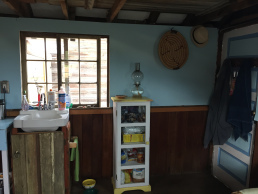
Stuff isn’t as convenient in my tiny house as it is in a full-sized house: I do have to climb up on my step stool and swing around in the rafters to get my salt, teacups, and Terry Pratchett books, but that’s really no big deal. I, as yet, still have all my physical faculties; I’m only mentally differently-abled.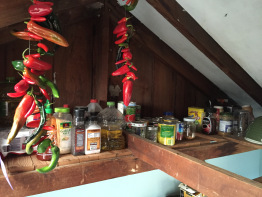
I don’t have many knick-knacks or decoration, except for a painting Phoenix did for me and a woven wool hanging I got from my grandmother. Most of my decoration is practical, like my oil lamp, my harvest basket, and my hanging peppers and herbs. But I can’t resist a little impractical decoration now and again. (The cattails in the corner (photo below) I’m going to use to try my hand at basket-weaving.)
I ’d love to hear how you creatively use space!
’d love to hear how you creatively use space!
Next time I’ll talk about how I grow and preserve my own food, and how I get by on a very small grocery budget.
Elizabeth Roderick is an author end editor. Find her on Amazon or on her website.


October 18, 2016
About Writing “On Trend”
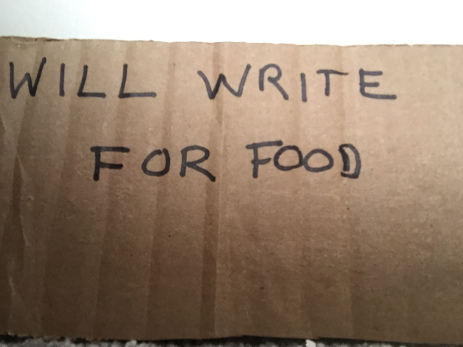 As a professional writer, it always pays to keep an eye on the industry. No one wants to write a book that they then have to shelve simply because it’s a played-out trend. But, as others have said over and over again, you should never try to write “on trend”. I personally believe that means you should not fail to write “off trend”, either: you shouldn’t decide not to write a book that you really want to, just because you’re afraid it won’t sell.
As a professional writer, it always pays to keep an eye on the industry. No one wants to write a book that they then have to shelve simply because it’s a played-out trend. But, as others have said over and over again, you should never try to write “on trend”. I personally believe that means you should not fail to write “off trend”, either: you shouldn’t decide not to write a book that you really want to, just because you’re afraid it won’t sell.
For one thing, you never truly have shelve a book if you don’t want to. Some things will always be in fashion, and other things come back into fashion again. It’s like when my 23-year-old boyfriend put on Abbey Road, then got miffed when I sang along with all the songs. He apparently thought The Beatles were some great band he’d rediscovered, not knowing that they’d never been un-discovered. Or it’s like when his 19-year-old best friend asked me, “Have you ever heard of this awesome band System of a Down???” Psh, step aside, little man. I was howling along with those fools when you were teething, but I’m glad they’re cool again.
If it doesn’t turn out that your genre is a trend that’s here to stay, and you don’t want to wait until it comes back into fashion (as it undoubtedly will one day), self-publishing and indie publishers are viable options. There is absolutely no shame in either, nor will you ruin your chances of hooking an agent with future books by taking that route.
Let’s look at how a trend generally happens (I’ll use genre trends as an example): someone writes a book that becomes really popular. Agents who really liked the book are excited to sign authors who write similar ones, and publishers snap them up, because readers are voracious locusts who will feast unrelentingly on that fresh crop of books until the stores and libraries are barren dust bowls.
Later, though, agents get tired of seeing query after query for the same darn thing (because writers also loved the book that started this whole mess, too…or because they unfortunately think deliberately writing “on trend” is a good idea). Publishers also eventually stop buying books in that trend, because the market is saturated. It isn’t because readers have stopped loving books in that genre, it’s just that there is now such a thriving crop of them that the locusts will have a hard time devouring them all in their lifetimes, and so it’s hard for one book to stand out and make money. That’s why, like I said above, self-publishing and indie-publishing are viable options for off-trend books: those books still have an audience, and you (or your indie publisher, who might specialize in that niche audience) can find them.
HOWEVER, just because you’re writing in a supposedly played-out trend doesn’t mean you’ll never find an agent or a big publishing deal, even before the trend comes back around. Say you write a spectacular vampire romance. You aren’t trying to copy Twilight, you just have this really powerful story that you HAVE to write, in your own new and different way. If that’s the case, you could probably find an agent that sees that greatness, and realizes they can pitch it with a spin that appeals to publishers.
With regard to trends besides genre trends, specifically the “first person, present tense fatigue” that I spoke about in my earlier piece…I’m sorry, but I find this “trend” hilarious in a way. I was wondering if this sort of thing would happen, since a while back a lot of agents were lamenting that they wanted to see more YA written in first person present. The thing about tenses and points of view is that, unlike genres, there are very few of them. As long as you’re choosing the ones that are best for your characters and story, and aren’t just writing or failing to write it in a certain way because you’re worried about trends, a reasonable agent won’t turn you down just because of that. Unless, perhaps, if it’s second person or future tense (though you could find the right agent for these if you are skillful).
Writing is indeed a business, but it is first and foremost an art. You should write the books that are in your heart, and write them the way you want, whether it’s on trend or not. There will always be more books for you to write in the future, and you will never lose out by telling the stories you hold dear now.





